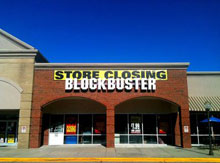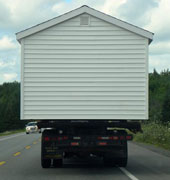The recovery may be rocky at the moment, but when it picks up steam, confidence will increase, jobs will return and the Great Recession will become an unpleasant memory (and perhaps a useful subject from which to draw policy lessons).
Even so, some industries will never recover because they're destined to go the way of milkmen and carriage makers. Which ones? Market research firm IBISWorld Inc. recently combed through a trove of data to determine the answer to this question.
The result: A list of the 10 worst industries in America, ones that had a steep decline in revenue in the last decade and are forecasted to further contract even more in the next one. Some of the industries on this list will not shock you, but others will be surprising.
Extinction is a hard word, but unfortunately that's what all these sectors are facing, due to external competition, technological change and lack of innovation. If you're looking for work in one of these doomed fields, you may want to consider a career transition, and quickly.
 Courtesy: vancouverfilmschool/flickr |
Calling Cut on Video Postproduction Services
One of the least publicized industries in terminal decline is video postproduction services. This field encompasses everything needed to prepare a film for distribution after the cameras have stopped rolling (or in the current age, after that little red recording light goes dark on the video camera).
Why the decline: Consolidation in the entertainment business is to blame. Movie studios are moving post-production in house. Meanwhile, technological advances have boosted efficiency -- as anyone who has seen the controlled chaos of a traditional celluloid cutting room versus the neat efficiency of digital editing software can attest. The results:
• Decline in revenue last decade: -24.9 percent.
• Forecasted decline in revenue in the next decade: -10.7 percent.
• Forecasted decline in the number of establishments next decade: -37.8 percent.
 Courtesy: Anthony L. Solis/flickr |
Extra! Extra! Newspaper Publishing on Its Last Legs
While book publishers avoided making the list this time around, another often discussed casualty of our all-conquering obsession with everything digital is on it: newspaper publishing.
Why the decline: The move to online news and the competition from a plethora of new media information sources are obvious culprits. Will paywalls, iPad apps and frantic innovating online save the traditional newsroom even if it doesn't save old-style inky paper? Maybe, but don't hold your breath. The numbers facing the newspaper biz are stark:
• Decline in revenue last decade: -35.9 percent.
• Forecasted decline in revenue in the next decade: -18.8 percent.
• Forecasted decline in the number of establishments next decade: -17.6 percent.
 Courtesy: Kheel Center, Cornell University/flickr |
Apparel Manufacturing Unraveling Fast
People certainly buy plenty of clothes these days, but with the price they're willing to pay for them, the chances of finding a "Made in the USA" tag is increasingly slim. So it's no wonder domestic apparel manufacturing is on the list of soon-to-be-extinct fields.
Why the decline: Cheap labor costs overseas, combined with consumers' expectation for a bargain at home, have put this U.S. industry in its death throes. Consider this:
• Decline in revenue last decade: -77.1 percent.
• Forecasted decline in revenue in the next decade: -8.5 percent.
• Forecasted decline in the number of establishments next decade: -11.3 percent.
 Courtesy: Vibrant Spirit/flickr |
Textile Mills Still in Existence ... Barely
No New Englander would be surprised to see American textile mills on this list. In New England, "mill town" is practically synonymous with industrial decay, conjuring images of boarded up factories, sky-high unemployment and the generalized gloom of inevitable decay.
Why the decline: Cheap competition from abroad, which has halved revenue in the last decade alone. That rattling sound? It's the last gasps of an industry:
• Decline in revenue last decade: -50.2 percent.
• Forecasted decline in revenue in the next decade: -10.0 percent.
• Forecasted decline in the number of establishments next decade: -12.8 percent.
 Courtesy: Mr. T in DC/flickr |
Formal Wear and Costume Rental Can't Disguise Decline
The formal wear and costume rental business is a surprise entry on the list. After all, high school kids continue to need fancy outfits for prom and Halloween rolls around every year.
Why the decline: An influx of cheap alternatives from abroad is the culprit again, with more cost-conscious Americans opting for disposable options each year. Purchasing, rather than renting formal wear is apparently also on the rise, but there is one tiny bright spot for the sector. "The tuxedo rental segment will keep the industry afloat," predicts IBISWorld, "because consumers are still likely to prefer the tuxedo rental service."
• Decline in revenue last decade: -35.0 percent.
• Forecasted decline in revenue in the next decade: -14.6 percent.
• Forecasted decline in the number of establishments next decade: -17.2 percent.
 Courtesy: aechempati/flickr |
Digital Killed the Record Store
DJs, collectors and hipster enthusiasts may argue, but the numbers don't lie. Record stores are on their last legs.
Why the decline: No mystery here. Consumers have been happily downloading and getting their occasional CD purchase from big box discounters like Walmart. IBISWorld argues that a recovery will slow the industry's decline, but those record stores that fail to get with the modern world and adapt to the new realities of music distribution will continue their downward slide no matter how buoyant the economy gets.
• Decline in revenue last decade: -24.9 percent.
• Forecasted decline in revenue in the next decade: -10.7 percent.
• Forecasted decline in the number of establishments next decade: -38.8 percent.
 Courtesy: yapsnaps/flickr |
R.I.P. Video Rental
The advance of technology and the internet isn't just a death sentence for the bricks and mortar music stores; it's pretty much the nail in the coffin for video rental business as well.
Why the decline: Why head to the local Blockbuster when NetFlix will deliver or offer for download any film you want? -- and that's not even mentioning the hundreds of movies available on cable TV. The industry's decline has been swift and irrevocable:
• Decline in revenue last decade: -35.7 percent.
• Forecasted decline in revenue in the next decade: -19.3 percent.
• Forecasted decline in the number of establishments next decade: -11.2 percent.
 Courtesy: NYCgal/flickr |
Death of the Local Photoshop
Another business destroyed by advances in technology: photofinishing shops.
Why the decline: Digital cameras and online image sharing make your local photo developer obsolete. Consumers also no longer need to pay to develop 20 pictures of squinting relatives to get one decent image. Check out the grim revenue figures:
• Decline in revenue last decade: -69.1 percent.
• Forecasted decline in revenue in the next decade: -39.1 percent.
• Forecasted decline in the number of establishments next decade: -33.3 percent.
 Courtesy: haven't the slightest/flickr |
Homes on the Move ... Downward
Manufactured home dealers prefabricate homes offsite and deliver them ready for installation. You might think they'd be an appealing option for consumers looking for inexpensive alternatives to the usual site-built home, but this is a case where the industry made some very bad strategic decisions and destroyed its market (as well as having the misfortune to suffer plummeting demand due to the housing crisis).
Why the decline: The industry has been squeezed between more innovative competitors and a drop in the price of traditional homes. Attempts to cut costs meant a less appealing product but not prices low enough to lure customers. The result: "Some of the steepest declines in revenue and establishments over the past decade," IBISWorld says.
• Decline in revenue last decade: -73.7 percent.
• Forecasted decline in revenue in the next decade: -62.0 percent.
• Forecasted decline in the number of establishments next decade: -58.7 percent.
 Courtesy: Trace Meek/flickr |
Unplugging Wired Telecommunications Carriers
When the whole world is buzzing about wireless and mobile communications, it's got to be depressing to be the traditional wired communications carriers. Who wants to be pinned down to an actual physical cord anymore when you can use Skype?
But this is one sector where IBISWorld thinks companies may be able to evolve rather than go completely extinct. There won't be too many traditional telephone companies in the future, but that's because the major players will "close their traditional wired services and direct funds to segments with growth potential, like VoIP and broadband internet."
• Decline in revenue last decade: -54.9 percent.
• Forecasted decline in revenue in the next decade: -37.1 percent.
• Forecasted decline in the number of establishments next decade: -15.9 percent.


